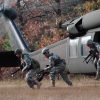calsfoundation@cals.org
Skirmish at Jacksonport
aka: Augusta Expedition (April 22–24, 1864)
| Location: | Jackson County |
| Campaign: | Expedition from Jacksonport to Augusta, Arkansas, and Skirmish near Jacksonport |
| Date: | April 24, 1864 |
| Principal Commanders: | Colonel Robert R. Livingston, commanding the District of Northeastern Arkansas (US); Unknown commander of elements of J. H. McGehee’s Regiment of Arkansas Cavalry (CS) |
| Forces Engaged: | First Nebraska Cavalry and Eleventh Missouri Cavalry (US); J. H. McGehee’s Regiment of Arkansas Cavalry (CS) |
| Estimated Casualties: | None (US); 1 killed, 4 captured (CS) |
| Result: | Union victory |
On April 24, 1864, the advance guard of Colonel Robert R. Livingston’s column returning from an expedition to Augusta (Woodruff County) briefly engaged elements of J. H. McGehee’s Regiment of Arkansas Cavalry outside of Jacksonport (Jackson County). After a short skirmish, Livingston’s column returned to Jacksonport as planned.
Moving from Batesville (Independence County) to Jacksonport, Colonel Livingston, commanding the District of Northeastern Arkansas, had planned to fortify a camp and gather much-needed supplies there before marching on to Augusta to clear supply lines further and obtain reinforcements. On April 20, 1864, Livingston’s men successfully defended Jacksonport from a surprise attack by Confederates. Later that night, he received a dispatch from Brigadier General Christopher C. Andrews in Augusta requesting that Livingston combine his planned move toward Augusta with Andrews’s operation against a rumored Confederate encampment of Brigadier General Dandridge McRae in northern Woodruff County. Livingston went south in the early morning of April 22 with 450 men from the First Nebraska and the Eleventh Missouri cavalries. Hampered by weather, Livingston pushed hard to move his column down the muddy roads to support Andrews.
Hearing that Andrews failed to find McRae and returned to Augusta, Livingston shifted his route, arriving there at 3:00 p.m. on April 22. Remaining in Augusta until 8:00 a.m. on April 24 to recover, Livingston turned the column back toward Jacksonport. Fording the swollen Village Creek without incident at 5:00 p.m. on April 24, the column continued another two to three miles before the advance guard commanded by Captain George W. Weber of Company M, Eleventh Missouri Cavalry, was attacked and driven back into the head of the column. Charging a larger force forward, Weber scattered the Confederates and chased them some seven miles before returning to Jacksonport. During the engagement, Weber’s men captured a captain, a lieutenant, and two privates and killed one sergeant, all reported to be from McGehee’s Regiment of Arkansas Cavalry.
Overall, the entire expedition had mixed benefits for the Union side. Livingston, unable to aid in an attack on McRae since he could not be located, exhausted his men and horses traveling into Woodruff County and back to Jacksonport. But combined with the attack on Jacksonport on April 20, 1864, Livingston’s command did hand the Confederates their second defeat in five days. During the march, Livingston also seized 300 head of cattle, twenty-six horses, and twenty-six mules. In his report, he noted escorting ten African Americans back to Jacksonport before enlisting eight of them as cooks for the Union army.
The skirmish near Jacksonport on April 24, 1864, is typical of the engagements in northeastern Arkansas during the later portions of the war. The Federals, with larger numbers, were usually moving through the countryside; the numbers engaged and lost by both sides were rather low; and the vast majority of these skirmishes had little strategic value for either side.
For additional information:
The War of The Rebellion: A Compilation of the Official Records of the Union and Confederate Armies. Series I, Vol. 34 (Part I), pp. 899–902, and Series I, Vol. 34 (Part III), pp. 181–182. Washington DC: Government Printing Office, 1891.
Watson, Lady Elizabeth. Fight and Survive: A History of Jackson County, Arkansas in the Civil War. Conway, AR: River Road Press, 1974.
Derek Allen Clements
Black River Technical College







Comments
No comments on this entry yet.